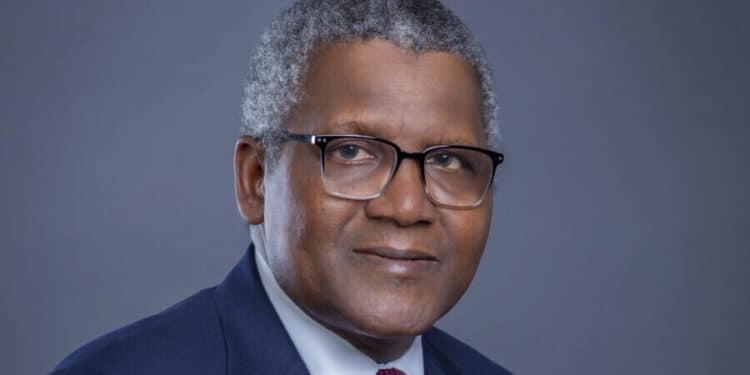Title: The Tug of Oil: How International Companies are Challenging Dangote Refinery’s Vision for Nigeria
In the bustling landscape of Nigeria’s oil sector, the Dangote Oil Refinery and Petrochemicals has emerged as a beacon of promise, a symbol of local ingenuity taking on global giants. Yet, this dream of self-sufficiency in oil refining is under threat, and the story behind it reads like a high-stakes thriller where the protagonist faces daunting odds against a powerful antagonist. The vice-president of oil and gas at Dangote Industries Limited (DIL), Devakumar Edwin, recently pulled back the curtain on the challenges facing the refinery, revealing a narrative rife with intrigue, conflict, and an urgent call for action.
A Heroic Endeavour Under Siege
At the heart of this drama is a fundamental conflict between national ambition and international corporate interests. Dangote’s refinery, a project of epic proportions and potential, stands alone in fulfilling its promise from a field of 25 licensed endeavours to build refineries in Nigeria. This is no small feat. Imagine a marathon where only one runner, against all odds, crosses the finish line, only to be tripped up by shadowy figures who never wanted to see them succeed.
Devakumar Edwin’s revelations to journalists were nothing short of a rallying cry. He painted a vivid picture of international oil companies (IOCs) working meticulously to frustrate Dangote’s efforts to secure local crude oil. The IOCs, he claimed, have been leveraging their clout to inflate local crude prices significantly above market rates, effectively forcing the refinery to import crude from distant sources like the United States. This, as Edwin explains, is not just an economic inconvenience but a strategic blow designed to hobble the refinery’s operations.
The Hidden Hand of Economic Sabotage
The underlying narrative Edwin suggests is one of economic sabotage. In his view, are intent on maintaining a status quo where Nigeria remains a supplier of raw crude and a dependent consumer of refined petroleum products. It’s a strategy that ensures their home countries reap the benefits of value-added processes, job creation, and economic growth, all while Nigeria remains chained to a cycle of dependence and economic subjugation.
“It appears that the IOCs’ objective is to guarantee that our Petroleum Refinery fails,” Edwin expressed, with a disappointment that echoes the assumptions of numerous Nigerians tired of the country’s role as a mere exporter of raw materials. “They create wealth for themselves at our expense,” he continued, describing a scenario where Nigeria is continually left out of the wealth-generation loop, watching from the sidelines as other countries profit from its resources.
A Plea for National Support
Edwin’s plea to the Nigerian government was as clear as it was urgent: support local industry, curb the predatory practices of international players, and ensure that the country’s oil resources benefit its own people first. He highlighted that despite the refinery’s capacity to produce cleaner, ECOWAS-compliant diesel, the Nigerian market is flooded with highly contaminated diesel imported from places like Russia. This high-sulfur diesel not only undercuts local production but also poses significant health and environmental risks.
Edwin’s frustration is palpable as he recounts how European countries, alarmed by the carcinogenic effects of such fuel, have banned its export to West Africa. Meanwhile, Nigeria continues to grant import licenses for this “dirty diesel,” further jeopardizing the health of its citizens and the viability of its own refining industry.
The Challenge of Competing Against Multinationals
The challenges faced by the Dangote refinery are emblematic of a larger struggle for economic self-determination. Multinational corporations, with their vast resources and global reach, are formidable opponents for any local industry. Their ability to manipulate market conditions, influence policy, and stifle competition is a significant hurdle for businesses like Dangote, which are working to change the economic narrative of their countries.
Edwin’s account of the situation underscores a pressing need for the Nigerian government to take a more proactive role in supporting local industries. The country has the capacity to not only meet its own fuel needs but to export surplus products, thereby enhancing its economic stability and growth. Yet, the current policies and practices seem to favor foreign interests, perpetuating a cycle of dependency and economic exploitation.
A Call to Action for Nigeria
In his impassioned appeal, Edwin called for urgent intervention by the federal government and the national assembly. He stressed the importance of the Petroleum Industry Act (PIA) in providing a framework for the equitable distribution of oil resources and the support of local refining capacities. Implementing the PIA effectively, he argued, is crucial to ensuring that Nigeria’s oil wealth benefits its people rather than enriching foreign corporations.
Edwin’s message is a powerful reminder of the stakes involved in Nigeria’s oil sector. It’s a call to action for a country that has the potential to be a leader in energy production and a beacon of economic independence in Africa. The Dangote refinery, with its capacity to produce high-quality diesel and aviation fuel, represents a significant step towards this vision. However, without concerted efforts to address the challenges posed by international oil companies and support local industries, this vision remains at risk.
The Road Ahead
The story of the Dangote refinery is far from over. It’s a narrative that encapsulates the broader struggles of developing countries to harness their natural resources for national development. As Nigeria grapples with the complex dynamics of its oil sector, the outcome of this struggle will have far-reaching implications not just for the country but for the region as a whole.
Edwin’s plea is more than a call for help; it’s a clarion call for a reimagined future where Nigeria stands tall, not as a raw materials supplier but as a powerhouse of refined petroleum products, driving economic growth and prosperity for its people. The battle is on, and the stakes could not be higher.



